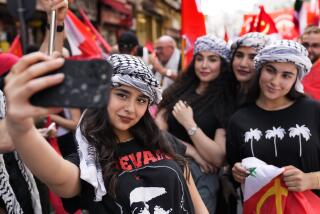Thousands of Solidarity Supporters Stage Protests, Battle Polish Police
- Share via
WARSAW — Thousands of Solidarity supporters in Warsaw, Gdansk and at least three other Polish cities marched in unofficial May Day demonstrations Wednesday to protest food price increases and political arrests.
Clashes with police were reported in three cities.
In Gdansk, riot police equipped with shields and helmets used tear gas, water cannons and truncheons to disperse an angry crowd of 2,000 to 3,000 mostly young demonstrators after some threw stones at police officers. It was Poland’s most serious disturbance in a year.
Government spokesman Jerzy Urban said later that efforts by Solidarity, the underground trade union movement, to disrupt official May Day celebrations had failed throughout Poland. He also said that security forces foiled a “planned demolition of radio installations,” but he gave no details.
In Gdansk, a riot policeman was knocked to the ground and beaten by demonstrators, and an ambulance took him away with apparently serious injuries. A police van slammed into a demonstrator who was said to have thrown a rock at the police.
Scores of protesters were arrested in the hourlong melee, and the scene of the clash, about a mile from the official parade route in the Baltic port city, was left strewn with stones and debris. There were no official reports on the number of people injured or arrested.
Official March Halted
The violence followed two attempts by several hundred Solidarity activists to force their way into the official May Day parade in the center of Gdansk. The police used batons to disperse the demonstrators, but not until after their second charge halted the official march for 10 minutes.
Solidarity leader Lech Walesa, who lives in Gdansk, was turned away peacefully by several hundred police about a mile from the official parade route as he walked with a group of supporters.
“We have no intention of getting into fights,” Walesa said in a statement issued later at his apartment. “It is a shame that someone divides us so brutally.”
In the western city of Poznan, riot police used truncheons to break up a crowd of about 2,000 demonstrators who attempted to march from a Roman Catholic Mass to a monument to workers who were killed in anti-Communist riots in 1956.
2,000 Dispersed
Riot police in Nowa Huta, the steel-making suburb of Krakow in southern Poland, dispersed 2,000 demonstrators without the use of force, according to witnesses. There were also unconfirmed reports that the police used tear gas against demonstrators in Lodz, Poland’s second-largest city.
Heavy police security was reported in Krakow, Czestochowa and Wroclaw, but no demonstrations occurred there, at least partly because of freezing rain that fell over much of southern Poland.
In Warsaw, an estimated 10,000 to 15,000 demonstrators marched peacefully for nearly two hours through the city’s northern district of Zoliborz, chanting Solidarity slogans. The police ordered the crowd to disperse and there was no violence, but two senior Solidarity figures who led the march, Seweryn Jaworski and Jacek Kuron, were later detained by police.
Hundreds of uniformed and plainclothes policemen, backed by dozens of water cannons, were deployed in Warsaw to prevent demonstrators from converging on the official May Day parade in the city center.
Ignoring the Solidarity protests, Gen. Wojciech Jaruzelski, the premier and Communist Party leader, declared in a generally optimistic May Day address that “the time of unrest, anarchy and disruption is gone” in Poland.
The country still faces many problems, Jaruzelski said, but he added:
“Let us look at this from the other side. How much better than a few years ago is the atmosphere in which we are celebrating May Day today. How much work we have done, and how much peace has come to Poland. But also how much more we can still do.”
More to Read
Sign up for Essential California
The most important California stories and recommendations in your inbox every morning.
You may occasionally receive promotional content from the Los Angeles Times.










